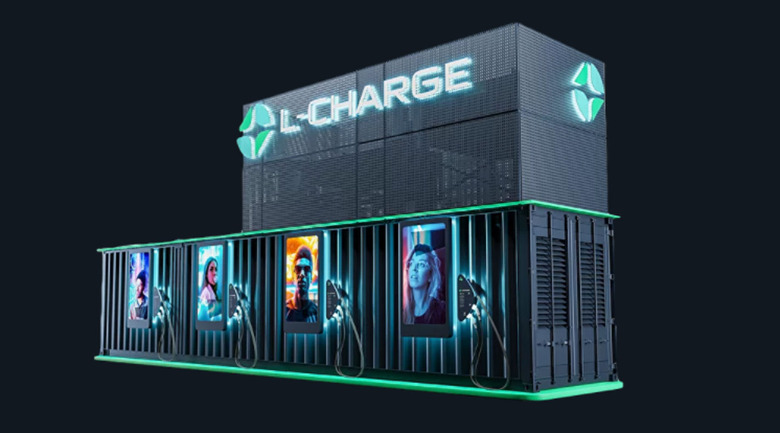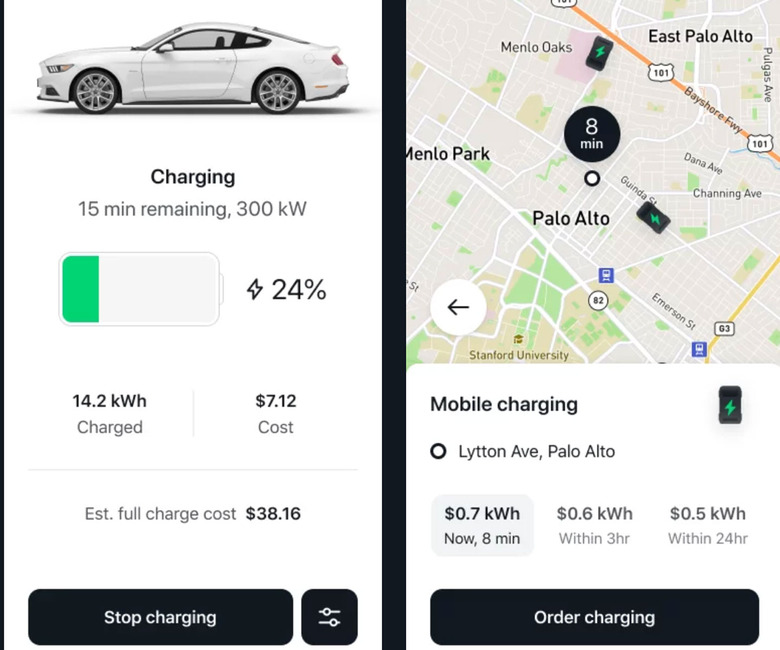L-Charge Aims To Bring The Charger To The EV Owner
One of the biggest challenges with the rollout of electric vehicles remains the electric charging infrastructure. In most major cities around the world, there are electric chargers available at locations like parking garages, grocery stores, and business parks. However, in many rural areas worldwide, there is no electric vehicle charging infrastructure. A company from Russia called L-Charge wants to change that with electric vehicle charging stations that are mobile and produce zero emissions electricity without needing to connect to the grid.
Mobile and Stationary Chargers
L-Charge has two types of charging stations. One is a charging station mounted inside of a truck that can drive wherever the electric vehicle owner is to charge them up. Its other charger type is a large stationary unit with a power generating station is stacked atop a large shipping container with four charging stations on the side. The stationary charging station can charge electric vehicles as fast as they can accept electricity.
L-Charge notes that the stationary charging station can also power the electric grid during peak hours to generate additional income. It's also capable of providing surplus electricity to nearby consumers. L-Charge says that a single stationary charging unit can charge up to 288 cars per day while generating up to 7200 kWh of daily electricity. Each stationary charging station requires no permanent staff and can be fully installed in a single day.

The mobile charging station can also charge vehicles as fast as they can accept electricity. L-Charge sees its mobile charging station as an ideal solution for EV car-sharing and subscription services. Since it's mobile, the company also believes it would promote electric vehicle use in urbanized areas.
While the company aims those mobile charging stations at urbanized areas, they may be the ideal way to get electric vehicle charging into smaller cities that lack a charging infrastructure. Each mobile charging station can charge up to 48 cars per day, generating 1440 kWh of electricity daily. With its mobile nature, the vehicle-based charging station can be used anywhere in the city.
The App
L-Charge mobile charging stations would be dispatched using an app, giving users the option of calling the mobile charger immediately, within a few hours, or within 24 hours. The kWh rate would vary depending on how quickly the EV owner required the mobile charger to show up. In the app screenshot, the rate is listed at seven cents per kWh for the mobile charging station to show up immediately, six cents per kWh to show up within three hours, or five cents per kWh for it to show up within 24 hours.

The app screenshot shows that a complete vehicle charge would be $38.16. Oddly, the app screenshot shows a Mustang GT, which is not an electric vehicle. It's very odd for electric vehicle charging company to share screenshots showing a traditional combustion-powered car. Certainly, it's a placeholder, but any electric vehicle would've been a better placeholder than the Mustang.
Electricity Generation
Both the mobile and stationary charging stations utilize the same technology inside to generate electricity. L-Charge says natural gas and hydrogen can be used as gas or liquid for conversion into either low-carbon or clean energy. The charging stations can operate on liquefied natural gas or a mixture of liquefied natural gas and hydrogen, producing their electricity on-site.
L-Charge says that low-carbon fuels are the most economically feasible fuels on the market and could be utilized as a bridging technology in the move towards carbon-neutral solutions such as hydrogen. The company also says that even if electricity is generated using pure liquefied natural gas, it still substantially reduces emissions. Presumably, the company means it substantially reduces emissions compared to charging from the grid.
L-Charge Goals and Usage
L-Charge has a goal of generating $2 billion in revenue by 2026. The company sees its mobile and stationary charging stations as a solution for the lack of charging availability. Perhaps the most likely place for its charging stations to be utilized is by fleet owners who need a way to charge heavy trucks and machinery. While electrified semi-trucks and heavy machinery aren't common today, they are certainly being developed and will be common in the future.
L-Charge also believes its off-grid charging stations are an ideal solution to traditional electric grids that are limited for new connections. Since both of its charging systems can charge vehicles as fast as they can accept the electricity, the solutions could also be an answer to getting FAST chargers deployed more quickly. L-Charge stationary charging stations can be fully autonomous for up to two weeks at a time. Presumably, the limitation is how long its fuel source can last.
